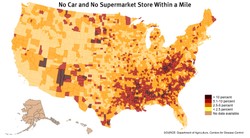Recently I visited a local area in Dallas described as a food desert. This term describes an urban area lacking quality fresh food. Usually the closest grocery store or market is as far away as three miles. This mileage may not seem like much but when you factor in a walk to a bus stop, the bus ride, a walk to the store, shopping for your family, only being able to purchase what you can carry, a walk back to the bus stop, the bus ride home, and the walk home from the bus stop, what seems like a short trip to the grocery store can be a stressful daily task. Many people without cars in low income neighborhoods simply cannot afford to do it. I realized how much I take day to day tasks like grocery shopping for granted. By visiting this community, Bonton Farms, I learned that inhabitants of a food desert are often increasingly ill. The statistics of this particular locale are the following: cardiovascular disease rate is 54% higher than that of the city of Dallas. Diabetes is 45% higher. Stroke 61% higher. Cancer 58% higher. These correspond directly to the lack of fresh food which starts a vicious cycle leading to a sedentary lifestyle and health issues.

What is a Food Desert and How Can you Help?
This piece defines a food desert and sheds light into how you can help provide food for people who need it. People living in urban areas often do not have access to fresh food.
A Day in the Sun
at Bonton Farms
Everyone knows our country has a staggering obesity rate compared to others. I have always looked at this from a personal standpoint, making sure I eat well, buy healthy groceries, and don't over do it on donut day at the office. When I was asked to participate in a volunteer day at Bonton Farms, I had no idea that the concept of a food desert would strike such a cord.
Arriving at Bonton, we are greeted by a man named Kenneth who proceeds to explain the concept of a food desert in a way that everyone can understand. People without cars, who use local transportation, have no way to make the journey to get fresh groceries to cook and feed their families. Realistically speaking, in an urban area, their best bet is often times the local convenient store with food options like chips, soda, french fries, etc. These options are cheap, easy, close by, and extremely unhealthy. It is no wonder the health statistics are negative here. One man with an idea is all it took to turn this community upside down. He decided to create a fresh farm to help feed the residents.
The farm is impressive, they grow their own vegetables, the able-bodied residents help out as much as they can, they have chickens, pigs, goats, and great attitudes about how much their lives have changed with just this small access to better food options. These individuals can now wake up with a purpose, to work on the land, and feed their families, instead of having to deal with the day to day stress of urban living. Our group helped clear the land of weeds so that new fresh food can be grown and new soil can survive.
While I learned that farming was not my calling in life, I felt great to help out. Luckily I wore my most athletic shorts and shoes because we were getting down and dirty. In clearing out weeds, I was paving the way for people with no access to fresh local food an opportunity to grow their own, find a purpose for their energy, and help their families overall well-being.
How can you help?
Obviously, volunteering your time to help out in a society like this is a great way to start. Pulling weeds, feeding the animals, visiting with the residents, and making it known you support the cause is an amazing feeling. Secondly, spread the word! Just because there is now a grocery store in the neighborhood, or someone is growing fresh vegetables, people need to know the benefits to eating this type of food. If you grew up living on only fried or frozen foods from a convenient store your whole life how would you know anything different? People need to get into these communities and educate the residents the importance of a fresh diet, share the statistics, offer help and hope. The stress of daily life for people living in low income neighborhoods is intense. Daily decisions can be monumental. If anything, spend some time offering hope to individuals. We should not look at all of these statistics, numbers, and groups without realizing helping just one person will make a world of difference. The old saying, you can give a man a fish or teach him how to fish (which will last forever) really does ring true here. Get out in the community, educate people, educate yourself, and spread hope.
You might also like
Simple Ways to Show Volunteer AppreciationSimple, inexpensive yet powerful ways to show volunteers how much they are ap...



 What Makes a Great Yoga Studioon 07/01/2016
What Makes a Great Yoga Studioon 07/01/2016

Comments